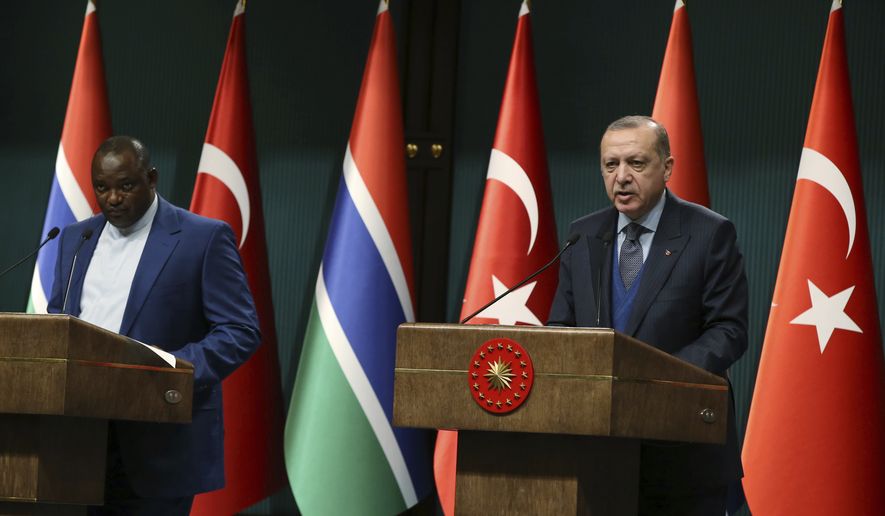OPINION:
The ongoing war in Syria coupled with the United States’ failure to extradite Fethullah Gulen, a radical Muslim cleric indicted by Turkish prosecutors for, among a plethora of other grave offenses, staging last year’s attempted coup d’etat against the democratically elected government of Turkey, have badly deteriorated bilateral cooperation between the two nations.
Washington’s operational, training and logistical support for Kurdish Democratic Union Party (PYD) forces, patronage that led to the Afrin crisis, has sparked an open-ended conflict between these two key NATO allies. Moreover, diplomatic dialogue continues at an all-time low due to Washington’s reluctance in resolving Gulen’s extradition.
The fact that Gulen remains free, living in luxury in Pennsylvania — even as he is investigated for a colossal taxpayer fraud scheme involving his largest in the nation network of charter schools — does not sit well with Turkey. Making matters worse, Gulen is to Turks what Osama bin Laden was to Americans and the attempted coup, for them, is analogous to 9/11, but this seems to fall on deaf ears at the U.S. Departments of Justice and State.
Such a stalemate among the two close allies is endangering real progress made in the war against the Islamic State, while providing Russia and Iran with a largely unchallenged and direct means of influence and access to the Middle East, as they each build toward hegemony in the region. The dearth of reliable allies in the region notwithstanding, Washington’s support for the PYD is weakening long-term U.S. geostrategic interests.
It is imperative for the U.S. to reestablish close dialogue and coordination with its Turkish partners, find a strategic common ground and refrain from further assisting the YPD rebel forces in Syria, Iraq and beyond.
Under the leadership of the Trump administration, the U.S. has made great strides against ISIS. However, the war’s implementation strategy is somewhat ambiguous and, in reality, has outflanked America’s genuine long-term interests. Simultaneously, Mr. Trump inherited the feckless and fuddled strategies of the Obama administration, ones that seem tailor-made to further the geostrategic interests of Iran and Russia, while leaving indispensable allies like Turkey and Israel in positions averse to long time stated American interests.
Despite the tangible results delivered in the fight against ISIS, American statesmen have failed to acknowledge that PYD — an affiliate of the Kurdistan Workers Party (PKK) — has been fighting the Turkish government since 1984 and aspires to establish an independent Kurdish State that is contrary to international law, Turkish territorial sovereignty and harms overall regional stability.
President Recep Tayyip Erdogan cautioned in July 2012 that Ankara’s armed intervention against PYD in Syrian territory “would be [Turkey’s] most natural right,” declaring that his government will not accept PYD’s presence in the south. Therefore, it is not surprising that Ankara established a buffer zone, 28 miles wide near Afrin.
During the last three years, Turkish forces were forced to intercede in the border towns of Kobane and Tal Abyad. Meanwhile, the YPD, trained by U.S. Special Forces, succeeded in shifting Washington’s priorities from directly fighting ISIS to their training. Dire for Turkey and the U.S./Turkey alliance (as well as NATO) is impending day when, with the support of Assad, Turkey is forced to fight these same U.S. trained and equipped PYD forces.
As Washington aims to justify and rationalize its influence in the middle of such a politically complex region engulfed by war and turmoil, it must use Syria as an irreducible instrument of unity with Mr. Erdogan’s Turkey and lead a mutually agreed military strategy with Ankara instead of transforming the Kurdish into a border force.
Washington’s fissures with Ankara and its rhetorical modus operandi can quickly be repaired provided that the U.S. act quickly to extradite Fethullah Glen; actively participate in Operation Olive Branch launched by Turkey on January 20; provide intelligence and logistical support for Ankara in the bordering territories nearby Bursaya Mountains, Bulbul, Shinkal and Jandeiris, as well as help Turkish authorities to secure the Afrin-Raju main road.
It is widely understood that in the near future Damascus will provide the YPD with a blank check to inflict major damage on Turkish armed forces in the region, moreover the Russian air force will likely close Afrin airspace to Ankara’s war planes. The U.S. must support Turkey to avoid some of the difficulties experienced in the asymmetric conflict of Euphrates Shield. Washington must provide reliable intelligence to enable Turkey to fight light mobile units equipped with antitank missiles and support Turkey’s tank arsenal in the face of improvised explosive devices.
In the final calculus, Syria will remain a vastly smaller, yet still important vassal of Iran. Russia will continue to attempt to take control of the vast areas that once comprised Syria. For the United States, sooner or later, it comes down to preventing Iranian and/or Russian hegemony in the region and the U.S. must address this scenario with a stable and strong alliance with Turkey.
• Peter M. Tase, a strategist on the geopolitics of the Middle East, the former Soviet Union and South America, is the founder of Paraguay Economic Forum.




Please read our comment policy before commenting.